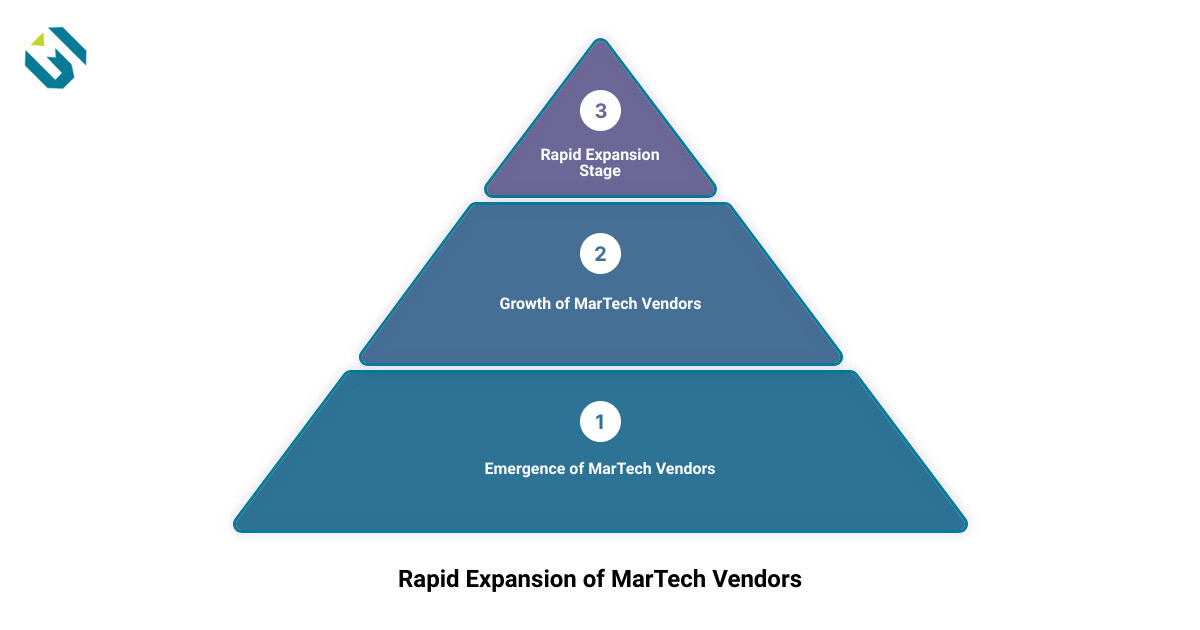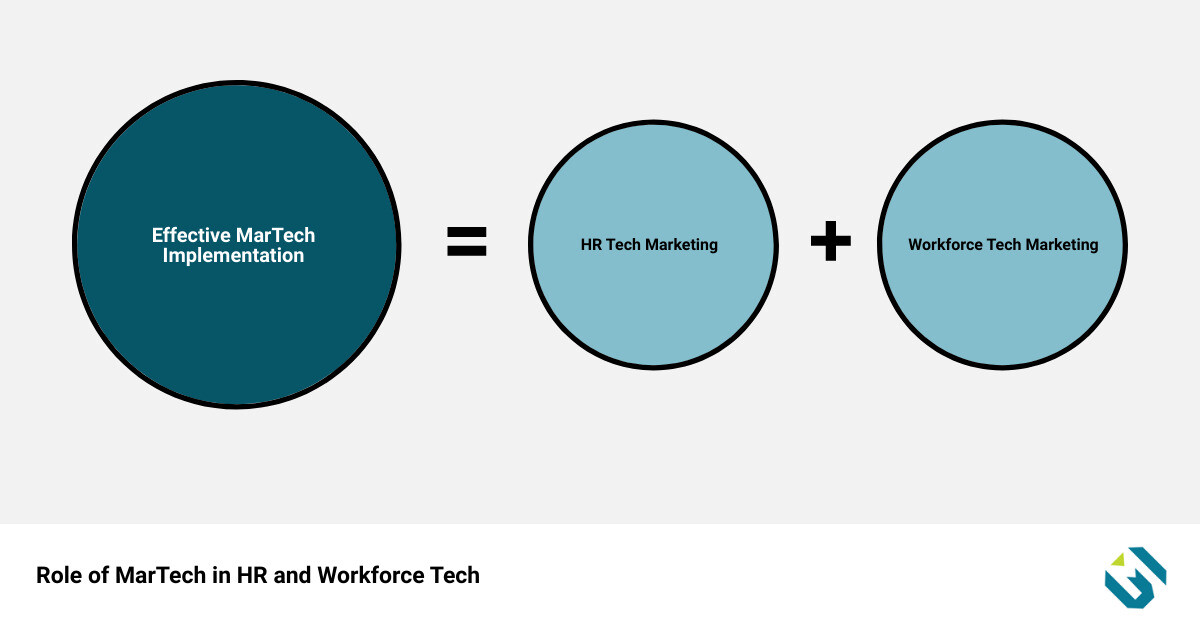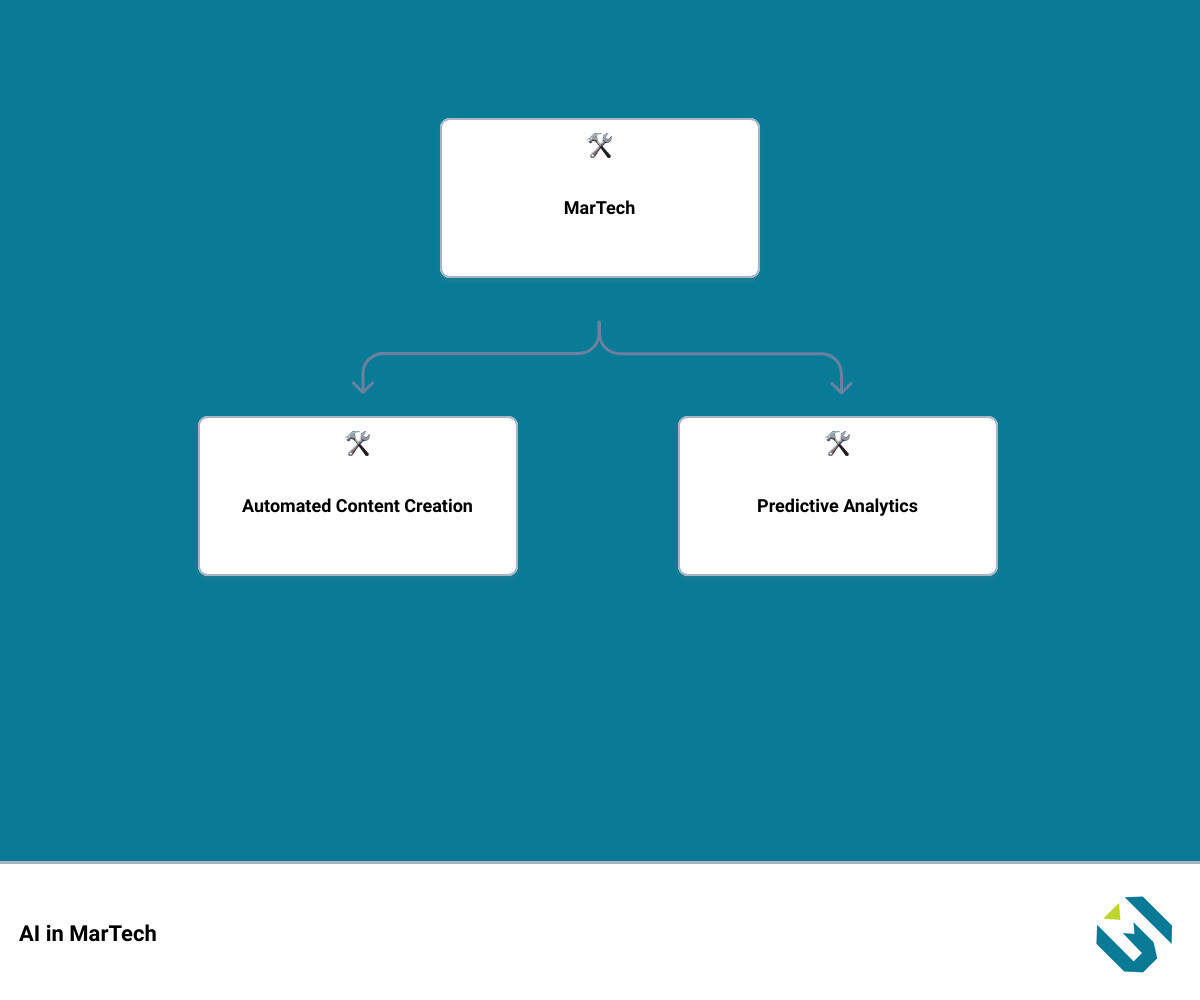Marketing Technology or MarTech, once a mere buzzword, has now transformed into an indispensable part of the business landscape. With an explosion of digital channels and increasingly sophisticated consumers, marketers have turned to technology to streamline their efforts and deliver more personalized experiences. In the realm of HR technology and workforce technology companies, this need for advanced marketing tools is even more pronounced. The cluttered market, combined with the specific demands of their target audience, necessitates a fresh approach to marketing – one that’s powered by robust marketing technologies.
Introduction: The Evolution of Marketing Technology
In the digital age, the marketing landscape is continually evolving, spurred on by rapid advancements in technology and changing consumer behavior. The dawn of marketing technology, or MarTech, has revolutionized the way businesses approach marketing, especially in niche sectors like HR tech and workforce tech.
MarTech, a term that’s searched over 10,000 times a month in the United States alone, refers to a suite of software and tools designed to assist in achieving marketing goals. But it’s more than just a set of tools – it’s a fundamental shift in how companies approach marketing, particularly in industries faced with a cluttered market, like HR technology and workforce technology.
Work technology marketing is a field that’s ripe for the benefits of MarTech. With the need to build digital footprints, target specific audiences, and drive high growth, leveraging MarTech is no longer a choice for these companies – it’s a necessity.
But as with any evolutionary process, there are challenges and learning curves. This article will delve into what MarTech really means, how it works, its growing significance in the business landscape, and specifically, its role in revolutionizing work technology marketing. It’s time to explore how MarTech can help HR tech and workforce tech companies cut through the clutter and reach their growth goals.
Understanding Marketing Technology and Its Role in Business
Defining Marketing Technology (MarTech)
With the boom in digitalization, the intersection of marketing and technology has become an integral part of the business landscape. This convergence is known as Marketing Technology, or MarTech. It encompasses a broad spectrum of tools and software utilized by marketers to optimize their efforts in achieving marketing objectives. Whether it’s through analytics, advertising, digital asset management, content creation, or customer relationship management, MarTech is the modern marketer’s best friend.
More than just a buzzword, MarTech is the backbone of any successful marketing strategy, and it’s here to stay. It’s the engine that powers a company’s marketing campaigns, from planning to execution, across a myriad of channels.
The Importance of MarTech in Modern Business
In today’s fast-paced digital world, MarTech is no longer a luxury, but a necessity. It plays a crucial role in enabling businesses to streamline their marketing processes, make data-driven decisions, and deliver personalized experiences to their customers.
For HR tech and workforce tech companies, MarTech can be the catalyst for growth. In an industry where the competition is fierce and the market is cluttered, MarTech provides the tools needed to stand out and engage the ideal customer profile audience effectively.
Employing the right MarTech tools can help these companies build brand awareness, establish credibility, foster trust, and ultimately drive revenue growth. It’s the key to unlocking the full potential of digital marketing and transforming the way businesses connect with their customers.
How Marketing Technology Works
The power of MarTech lies in its ability to automate and optimize marketing functions. It leverages technology to plan, execute, and measure the effectiveness of marketing campaigns.
Imagine a marketing team designing an email campaign. They would use MarTech tools to segment their audience, craft personalized messages, schedule the emails, monitor open and click-through rates, and analyze the results. This process, which could be time-consuming and prone to errors if done manually, becomes streamlined and efficient with the help of MarTech.
Moreover, MarTech can integrate different tools and platforms into a unified system known as a MarTech stack. This stack enables marketers to manage all their activities from a single platform, providing a holistic view of their marketing efforts and improving coordination and efficiency.
In essence, MarTech takes the guesswork out of marketing. It provides actionable insights and measurable results, allowing businesses to fine-tune their strategies and maximize their return on investment. Whether it’s understanding customer behavior, tracking campaign performance, or predicting future trends, MarTech is the secret weapon that gives businesses the competitive edge they need to thrive in the digital age.
As we dive deeper into the world of MarTech, keep in mind that its purpose is not just to make marketing easier, but more importantly, to make marketing more effective. The next sections will shed more light on the growth and evolution of the MarTech industry, the types of marketing technology businesses should leverage, and the role of MarTech in HR tech and workforce tech companies.
The Growth and Evolution of the MarTech Industry
With the advent of digital transformation, the marketing technology industry has experienced an incredible surge in growth. The landscape has evolved from a few simple tools to a complex ecosystem of thousands of vendors and solutions. This section will explore the rapid expansion of MarTech vendors, the emergence of new MarTech categories, and the impact of venture capital investment on the MarTech industry.
The Rapid Expansion of MarTech Vendors
There was a time when MarTech was merely limited to a handful of technologies. Fast forward to today, and the MarTech landscape is a thriving ecosystem with an estimated 10,000 to 15,000 options. This rapid expansion of MarTech vendors is reflective of the growing needs of businesses to leverage technology for their marketing efforts. Whether it’s digital ad management, website management, or marketing automation, the influx of vendors has provided businesses with a plethora of options to optimize their marketing campaigns.
The Emergence of New MarTech Categories
As the MarTech industry grows, so does the diversity of its offerings. MarTech applications have expanded to meet evolving business needs, with new categories emerging. For example, artificial intelligence, audience segmentation/intent, behavioral and business intelligence analytics, and web performance/security were all new additions to CabinetM’s launch list in 2022. Other categories like enterprise data management, event management, productivity/workflow, and video creation have remained popular choices over the years. This emergence of new MarTech categories has enriched the ecosystem, offering businesses more nuanced and tailored solutions for their unique marketing needs.
The Impact of Venture Capital Investment on the MarTech Industry
Venture capital investment plays a significant role in the growth and evolution of the MarTech industry. However, investment in MarTech companies saw a sharp decline in 2022, falling over $11 billion from the previous year. This downturn was a result of economic uncertainty and “investment fatigue”. Despite this, the MarTech industry remains robust and continues to evolve, driven by the increasing need for advanced marketing technologies.
In summary, the MarTech industry is a constantly evolving and growing field, shaped not only by the rapid expansion of vendors and the emergence of new categories, but also by the flux of venture capital investment. As we continue to navigate the digital age, understanding these trends and their impact on the MarTech industry is crucial for HR tech and workforce tech companies looking to leverage MarTech for their marketing efforts.
Key Types of Marketing Technology Every Business Should Leverage
In the era of digital transformation, there are some key types of marketing technology that every business, including HR tech and workforce tech companies, should leverage to stay competitive. These technologies are essential tools for optimizing marketing efforts, gaining valuable customer insights, and driving high growth.
Advertising Technology
Advertising technology is a must-have for businesses aiming to reach larger audiences and gain a competitive edge. With tools such as Google search ads, Facebook remarketing ads, or LinkedIn targeted ads, businesses can effectively reach their ideal customer profile audience, build brand awareness, and drive engagement. Advertising technology is essential in navigating the cluttered digital market and getting your message across to the right people at the right time.
Analytics Tools
Next on the list are analytics tools. These tools provide invaluable insights into customer behavior, marketing campaign effectiveness, and ROI. Tools like Google Analytics and Amplitude Analytics can help businesses understand their audience better and make data-driven decisions. For HR tech and workforce tech companies, such insights can guide the development of targeted marketing campaigns that resonate with their audience and drive growth.
Content Management Systems
Content Management Systems (CMS) are another crucial MarTech tool. They help businesses manage and distribute marketing materials promptly, ensuring that no opportunities go to waste. CMS solutions, like Bynder’s DAM, leverage AI-powered search and versioning to help you find what you’re looking for quickly and efficiently. This increases the ROI of your marketing efforts by ensuring your content is easily accessible and usable.
Customer Relationship Management (CRM) Systems
Customer Relationship Management (CRM) Systems like Salesforce, Intercom, Marketo, and Hubspot play a pivotal role in marketing efficiency. By enabling customer retention, CRM systems generate more value from your existing customer base, increasing the ROI of your customer acquisition efforts. For HR tech and workforce tech companies, CRM systems are indispensable for managing customer relationships and maximizing customer value.
Social Media Optimization Tools
Social Media Optimization Tools are another key component of MarTech. Tools like TweetDeck and Bynder’s derivative features can streamline your social media operations, saving time and improving efficiency. These tools allow for easy management of multiple social media accounts and automate resizing of images for different platforms, making posting across various social media platforms a breeze.
Digital Asset Management (DAM)
Lastly, Digital Asset Management (DAM) solutions are vital for modern marketing teams. With the high volume of content being produced, DAM solutions ensure that your content is securely stored, organized, and easily accessible. This not only enhances the ROI of your content but also ensures that it gets used more frequently.
Leveraging these key types of marketing technology can revolutionize the way HR tech and workforce tech companies approach their marketing efforts, ultimately driving high growth.
The Role of Marketing Technology in HR Tech and Workforce Tech Companies
In a world where technology is king, standing out in the crowded HR tech and workforce tech market can be a daunting task. The increasing demand for digital transformation in the workforce has led to an explosion of HR tech and workforce tech companies offering innovative solutions. However, with this surge comes the challenge of differentiating oneself and reaching the ideal customer profile audience in a saturated market. This is where the power of marketing technology (MarTech) comes into play.
The Unique Challenges of Marketing in the HR Tech and Workforce Tech Industries
Marketing in the HR tech and workforce tech industries is not without its unique set of challenges. The sheer volume of solutions available presents an uphill battle for companies vying for the attention of potential customers. The key to overcoming these challenges lies in building awareness, credibility, and trust among the target audience.
Moreover, marketing in these sectors is not just about promoting a product or service. It’s about showcasing how these technologies can streamline operations, enhance productivity, and revolutionize workforce management. This requires a deep understanding of the HR tech and workforce tech landscape, as well as the ability to communicate the unique value proposition of these technologies in a compelling way.
How MarTech Can Help HR Tech and Workforce Tech Companies Break Through the Clutter
MarTech can be a game-changer for HR tech and workforce tech companies. By leveraging a range of software and tools, these companies can optimize their marketing efforts, reach their target audience more effectively, and ultimately drive high growth.
Key categories of MarTech that these companies can leverage include advertising technology, analytics tools, content management systems, customer relationship management systems, and social media optimization tools. These technologies can help companies strategically build a large, focused, and targeted digital footprint, enabling them to stand out in the cluttered market.
For example, analytics tools can provide valuable insights into customer behavior, helping companies tailor their marketing strategies to the needs and preferences of their target audience. Similarly, customer relationship management systems can help companies build and manage relationships with their customers, thereby driving customer loyalty and retention.
Case Study: GrowthMode Marketing’s Approach to MarTech in HR Tech and Workforce Tech Marketing
When it comes to harnessing the power of MarTech in HR tech and workforce tech marketing, GrowthMode Marketing stands out. The company combines the discipline of growth marketing with the principles of traditional marketing to develop integrated strategies and measurable programs that drive growth.
GrowthMode uses MarTech to help its B2B clients build robust demand generation strategies. These strategies not only help clients build brand awareness, credibility, and trust among their target audience but also drive high growth. By understanding the client’s specific goals, GrowthMode ensures that their marketing efforts are aligned with their broader strategic vision.
In conclusion, the role of MarTech in HR tech and workforce tech companies cannot be overstated. By leveraging the right MarTech tools and strategies, these companies can overcome the unique marketing challenges they face, break through the clutter, and drive high growth.
The Future of Marketing Technology: Trends and Predictions
As the digital landscape continues to evolve, so does the realm of marketing technology. New trends are emerging, driven by advances in technology and changing consumer behaviors. In this section, we’ll delve into the future of MarTech, exploring the rise of artificial intelligence (AI), the increasing importance of web performance and security, and predicted spending trends.
The Rise of Artificial Intelligence in MarTech
Artificial intelligence is reshaping the MarTech landscape. As highlighted in the CabinetM “MarTech Innovation” reports, AI was a new addition to the launch list in 2022. AI’s growing influence in MarTech is not surprising – it has the capacity to automate tasks, deliver personalized experiences, and generate insights from massive amounts of data.
AI can help HR tech and workforce tech companies understand their customers better, predict their needs, and deliver more personalized marketing campaigns. For instance, AI can analyze customer behavior and segment audiences based on their intent, helping companies target their marketing efforts more effectively.
The Increasing Importance of Web Performance and Security in MarTech
Another trend to watch is the growing emphasis on web performance and security in MarTech. Not only do websites need to be user-friendly and optimized for search engines, but they also need to be secure and perform well.
Web performance and security were new additions to the CabinetM’s MarTech launch list in 2022. Ensuring a website performs optimally and is secure is crucial for building trust with customers, protecting their data, and providing a smooth user experience. HR tech and workforce tech companies should prioritize these aspects in their digital marketing strategy to stay competitive.
Predicted MarTech Spending Trends
Although there was a decline in venture capital investment in MarTech in 2022, the industry remains vibrant and innovative. Despite economic uncertainty and investment fatigue, the need for advanced marketing technologies is not slowing down.
The MarTech Salary and Career Survey indicates that marketing professionals are earning substantial salaries, suggesting that businesses recognize the value of investing in marketing technology. As companies continue to navigate the digital landscape, we can expect to see sustained or even increased investment in MarTech, particularly in innovative areas such as AI and web performance and security.
In conclusion, the future of MarTech is promising and dynamic. By keeping an eye on emerging trends and investing in the right technologies, HR tech and workforce tech companies can leverage MarTech to overcome marketing challenges, reach their ideal customers more effectively, and drive high growth.
Conclusion: The Indispensable Role of MarTech in Revolutionizing Work Technology Marketing
In the digital age, marketing technology (MarTech) has become a critical catalyst for business growth. This is particularly true for companies within the HR tech and workforce tech industries. Amid a cluttered market, these companies must carve out their niche and communicate their distinctive value to their target audience. The role of MarTech in this process is both transformative and indispensable.
MarTech offers an extensive range of tools and software that enable companies to streamline their marketing efforts, optimize campaigns, and make data-driven decisions. From advertising technology and analytics tools to customer relationship management (CRM) systems, these technologies help businesses to create a powerful digital footprint that resonates with their ideal customer profile audience.
The rise of MarTech has also paved the way for marketing automation, enabling businesses to efficiently manage their marketing tasks, drive brand awareness, and foster credibility and trust. By leveraging the power of MarTech, companies can not only attract but also convert their potential customers into loyal advocates.
The success of GrowthMode Marketing serves as a testament to the power of MarTech in revolutionizing work technology marketing. Through a blend of strategy, messaging, PR, content marketing, and digital marketing, the company has managed to bridge the gap between marketing and sales, driving unprecedented growth for their clients in the HR tech and workforce tech industries.
However, it’s important to remember that MarTech is not a silver bullet. Its effectiveness lies in its strategic application. Demand generation, for instance, is not a one-time strategy but a continuous process that requires constant nurturing and optimization. As market dynamics shift, HR tech and workforce tech companies need to stay agile, adapt their strategies, and continue to invest in MarTech to sustain their growth in the long run.
Ultimately, the power of MarTech lies in its ability to revolutionize work technology marketing. By enabling HR tech and workforce tech companies to navigate the complexities of the market, stand out from the competition, and propel their growth, MarTech is proving to be an essential strategy for success in the digital age. Thus, it’s clear that the future of work technology marketing will be shaped by the innovative application and continuous evolution of MarTech.





